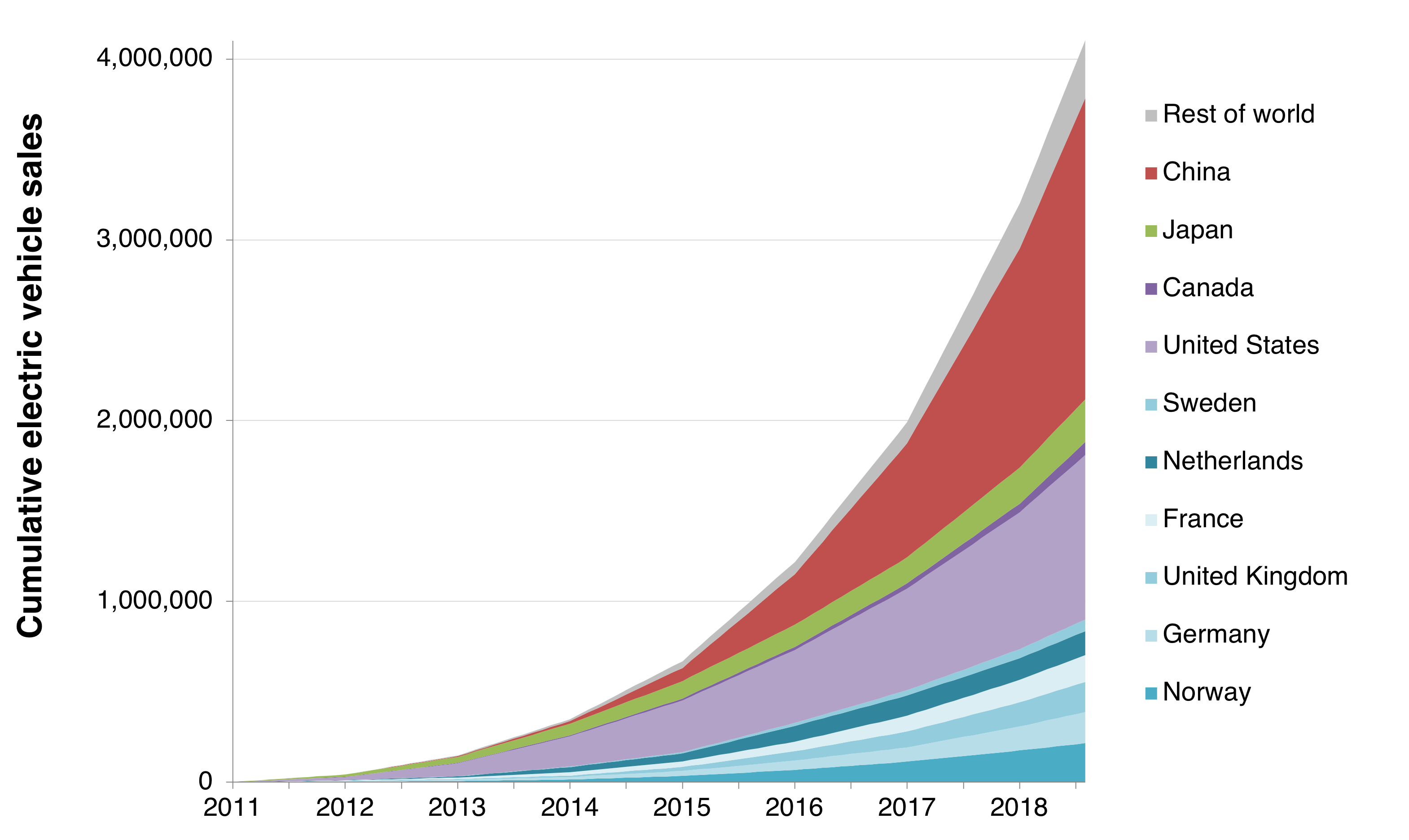The Global Climate Action Summit wrapped up September 14, 2018 in San Francisco, and what a week it was! The gathering of businesses, governments, and other groups interested in climate protection strengthened existing commitments and launched many new measures to combat climate change.
Of course, many speakers indicated that the transport sector remains a clear challenge with increasing mobility and freight trends. However, speakers also identified a clear solution: Zero-emission vehicles. ZEVs have advanced rapidly since the first plug-in models were released in late 2011. In just 7 years, ZEV sales have now surpassed 4 million globally—with the fourth million arriving just 8 months after the third. Yet, as current ZEV deployments still represent less than 2% of world vehicle sales, we all know the challenge is much bigger as we work toward a future where ZEVs go truly mainstream.

Zero-emission vehicle deployment from 2011 through August 2018
The Summit inspired many commitments to collective action by climate and clean transport champions to push toward high production ZEV economies of scale. Now that the dust has settled from the Summit, we’ll try to sum up the biggest transport decarbonization announcements. First, here the significant government announcements:
- Baden-Württemberg, the federal state in Germany where the combustion automobile was born, has committed to moving to 100% zero-emission vehicles—the 15th government to join the ZEV Alliance.
- Washington state also joined the ZEV Alliance, becoming the 16th government to signal its vision to move to 100% ZEVs and collaborate with its global counterparts to make it happen.
- Twenty-six cities around the world have signed the C40 Cities’ Fossil Free Streets Declaration, committing to 100% zero-emission buses by 2025 and making a major area of their cities zero emissions by 2030 (including top electric vehicle markets like London, Los Angeles, Paris, Tokyo).
- On the maiden voyage of a plug-in hybrid ferry, Governor Brown of California signed 8 bills that support a much broader market for ZEVs with incentives, charging infrastructure, truck deployment, and ride-hailing.
- Los Angeles, with its comprehensive Zero Emission Roadmap, signaled the city is all-in on going transport electrification plan for its fleet, buses, trucks, and then all private cars.
- Relatedly, Los Angeles with 400+ Climate Mayors, has launched a portal to encourage more cities to procure electric vehicles.
- Seventeen US states of the US Climate Alliance committed to using $1.4 billion (from Volkswagen settlement) on zero-emission vehicles and infrastructure.
At the same time there were many parallel business commitments to ensure commercialization and increased market uptake of ZEVs through 2030, creating a market pull to mirror the policy push from the governments. The following companies and business groups are stepping up on ZEVs:
- IKEA announced it will go to 100% zero-emission home deliveries in five major markets (Amsterdam, Los Angeles, New York, Paris, and Shanghai) by 2020, a bold plan that will jolt the market for local electric delivery vans and trucks.
- LeasePlan, an international vehicle leasing company offering fleet management services to companies and the public-sector, has committed to a net zero-emission fleet by 2030. Given that the company manages 1.8 million vehicles, this is bound to a large impact.
- Dozens of industry leaders, along with government officials, pledged to accelerate the deployment of zero-emission trucks and buses in their new “Drive to Zero” program, led by CALSTART.
- ChargePoint will increase its charging infrastructure 50-fold in just 7 years to 2.5 million chargers by 2025.
- EV Box will increase its charging infrastructure to 1 million charge points by 2025.
- The Hydrogen Council, a coalition which includes hydrogen providers like Air Liquide and vehicle manufacturers like Hyundai and Toyota, has committed to ensure 100% of hydrogen fuel used in transportation is decarbonized by 2030.
- Twenty-three business have now committed to transitioning to zero emission vehicles by 2030 and installing charging infrastructure at their premises as part of EV100. This includes new members Cliff Bar and Delta Electronics, joining Baidu, DHL, IKEA, and others.
Finally, there are three items to keep a close watch on going forward: Our colleagues at The Climate Group and C40 Cities continue to campaign for more state, city, and business commitments as part of their ZEV Challenge to send a strong message to the auto industry to move faster. So, stay tuned for more announcements to come during Climate Week in New York City later in September and at COP24 in December in Poland. Also, California Air Resources Board Chair Nichols and Nikolaj Coster-Waldau helped launch the New American Road Trip, which includes an epic cross-country all-electric road trip. I’ll be following them at @newamericanrt, as they make their way across the U.S. to New York Climate Week. Lastly, we at the ZEV Alliance seek to recruit more members in the weeks ahead to further grow the momentum toward zero-emission transport.
Congrats to all our government colleagues in the ZEV Alliance and beyond, and to all the industry champions around the world who are showing what it takes to get to a zero-emission transport sector. We all look forward to the collaborative work ahead!